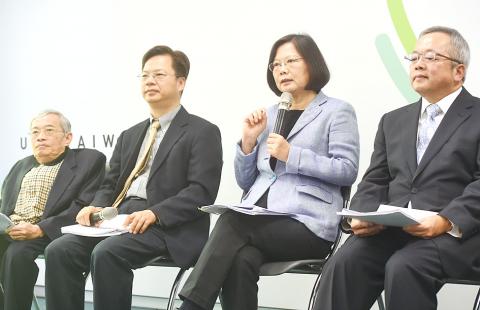The incoming administration is moving to establish a new quasi-sovereign wealth fund with local and overseas cash to finance emerging industries, a top adviser to president-elect Tsai Ing-wen (蔡英文) said yesterday.
According to a plan she is considering, the government would be the largest shareholder in the fund, with ownership at less than 50 percent, while the rest would be comprised of local and foreign investors, said Kung Ming-hsin (龔明鑫), Tsai’s top adviser on industry policy.
The fund would help nurture the development of key industries such as biotechnology and smart machinery, Kung said.

Photo: Chien Jung-fong, Taipei Times
“There is a lot of money in Taiwan, but people are just collecting fixed-interest payments,” said Kung, who is also vice president of the Taiwan Institute of Economic Research (台灣經濟研究院).
“An innovative financing mechanism can make full use of the local excess savings,” he said.
Tsai, who is to take office on May 20 after winning in a landslide in January’s election, campaigned on fostering new industries as economic growth slumps from a global trade slowdown.
The nation is facing increasing pressure to find new engines for growth as Chinese firms become more competitive and demand weakens in the electronics sector, its key export.
The new leadership hopes to keep central government deficit at less than 3 percent of GDP, so it needs to find more innovative ways to fund new industries beyond selling debt, Kung said.
The proposed fund’s investments would focus on five areas highlighted by Tsai’s campaign: “green” energy, biotechnology, national defense, Internet of Things and smart machinery.
While the fund might also acquire fledgling businesses, unlike Singaporean sovereign wealth fund Temasek Holdings Pte, it would not buy large companies.
Kung declined to comment on the size of the fund.
The new company might hire foreign managers, Kung added.
The Cabinet-level National Development Council said in July last year that it would consider forming a sovereign wealth fund, but added that it does not have to include foreign-exchange reserves.
Council Deputy Minister Huan Lin (林桓) this week said exploratory research conducted by the current administration would be passed to Tsai’s government if need be.
The nation’s economy grew 0.75 percent last year, the least since 2009, as exports shrank over the past 12 months.
Local technology firms have declined as demand for PC hardware fell, while those in other nations moved into Internet services.
The five worst performers in Morgan Stanley’s 106-member Asia-Pacific Infotech Index last year came from Taiwan.

NATIONAL SECURITY THREAT: An official said that Guan Guan’s comments had gone beyond the threshold of free speech, as she advocated for the destruction of the ROC China-born media influencer Guan Guan’s (關關) residency permit has been revoked for repeatedly posting pro-China content that threatens national security, the National Immigration Agency said yesterday. Guan Guan has said many controversial things in her videos posted to Douyin (抖音), including “the red flag will soon be painted all over Taiwan” and “Taiwan is an inseparable part of China,” while expressing hope for expedited “reunification.” The agency received multiple reports alleging that Guan Guan had advocated for armed reunification last year. After investigating, the agency last month issued a notice requiring her to appear and account for her actions. Guan Guan appeared as required,

A strong cold air mass is expected to arrive tonight, bringing a change in weather and a drop in temperature, the Central Weather Administration (CWA) said. The coldest time would be early on Thursday morning, with temperatures in some areas dipping as low as 8°C, it said. Daytime highs yesterday were 22°C to 24°C in northern and eastern Taiwan, and about 25°C to 28°C in the central and southern regions, it said. However, nighttime lows would dip to about 15°C to 16°C in central and northern Taiwan as well as the northeast, and 17°C to 19°C elsewhere, it said. Tropical Storm Nokaen, currently

‘NATO-PLUS’: ‘Our strategic partners in the Indo-Pacific are facing increasing aggression by the Chinese Communist Party,’ US Representative Rob Wittman said The US House of Representatives on Monday released its version of the Consolidated Appropriations Act, which includes US$1.15 billion to support security cooperation with Taiwan. The omnibus act, covering US$1.2 trillion of spending, allocates US$1 billion for the Taiwan Security Cooperation Initiative, as well as US$150 million for the replacement of defense articles and reimbursement of defense services provided to Taiwan. The fund allocations were based on the US National Defense Authorization Act for fiscal 2026 that was passed by the US Congress last month and authorized up to US$1 billion to the US Defense Security Cooperation Agency in support of the

PAPERS, PLEASE: The gang exploited the high value of the passports, selling them at inflated prices to Chinese buyers, who would treat them as ‘invisibility cloaks’ The Yilan District Court has handed four members of a syndicate prison terms ranging from one year and two months to two years and two months for their involvement in a scheme to purchase Taiwanese passports and resell them abroad at a massive markup. A Chinese human smuggling syndicate purchased Taiwanese passports through local criminal networks, exploiting the passports’ visa-free travel privileges to turn a profit of more than 20 times the original price, the court said. Such criminal organizations enable people to impersonate Taiwanese when entering and exiting Taiwan and other countries, undermining social order and the credibility of the nation’s